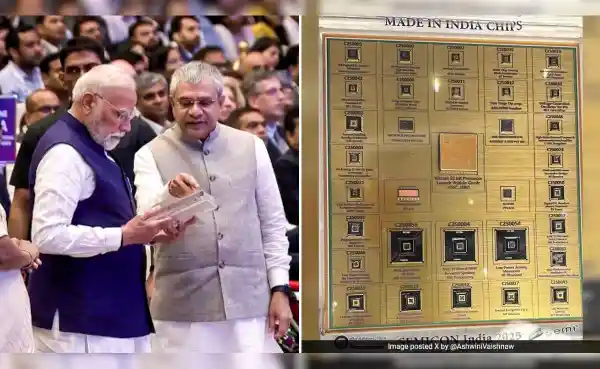India marked a milestone in its semiconductor journey with the launch of the country’s first fully indigenous 32-bit microprocessor, Vikram, at the Semicon India 2025 conference. The processor was presented to Prime Minister Narendra Modi by Union Minister for Electronics and IT Ashwini Vaishnaw, alongside test chips from four approved projects.

Vikram: Built for Space Applications
Developed by ISRO’s Semiconductor Laboratory, the Vikram processor is engineered to withstand the harsh conditions of space launch vehicles. Vaishnaw called the launch a critical step toward reducing India’s dependence on imported chips, especially in strategic sectors.
Rapid Growth of Semiconductor Infrastructure
Vaishnaw highlighted India’s progress in building its semiconductor ecosystem. Construction of five semiconductor units is currently underway, with the pilot line of one unit already completed and two more expected to begin production soon. Design work on another five units is progressing steadily, with ecosystem partners already engaged in the manufacturing pipeline.
Credit to Prime Minister’s Vision
According to Vaishnaw, the success stems from Prime Minister Modi’s push for self-reliance in semiconductors. “Just a few years ago, we launched the India Semiconductor Mission to make a new beginning. In just three and a half years, the world is looking at India with confidence. Today, we presented the first made-in-India chip to PM Modi,” he said.
India as a Stable Investment Destination
In his address to investors, Vaishnaw positioned India as a reliable growth hub amid global uncertainty. “We are living in turbulent times. In this backdrop, India stands as a lighthouse of stability. Our policies are stable, and our demand is strong,” he noted. Electronics production in India has grown six times in the past decade, while exports have expanded eight times, creating a strong case for global investment.
Strong Talent Base in Chip Design
India is already a global hub for semiconductor design. A Bastion Research report revealed that around 20% of the world’s chip design engineers are based in India, working across global firms such as Qualcomm, Intel, Nvidia, Broadcom, and MediaTek, which operate large R&D and design centers in Bengaluru, Hyderabad, and Noida.
Policy Support for Self-Reliance
Launched in 2021, the Semicon India Programme under the India Semiconductor Mission (ISM 1.0) has pledged around ₹76,000 crore in incentives to attract global manufacturers and strengthen the domestic ecosystem.
A Step Toward Strategic Independence
The unveiling of Vikram and the construction of new fabs mark the beginning of India’s broader semiconductor ambitions. By investing in both chip design and manufacturing, New Delhi aims to establish the country as a global hub for semiconductors, critical not just for economic growth but also for technological and strategic independence.
